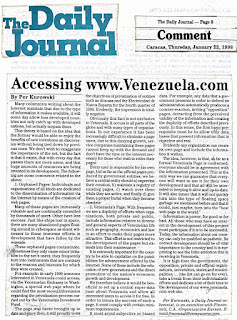The merry-go-round of aluminum prices
Any time now, either the privatization of the aluminum industry goes forward or the process is delayed indefinitely, rather, definitely delayed until after the upcoming presidential elections.
One of the most debated issues during the run-up to privatization has been that of the establishment of the price at which the privatized entity will supply primary aluminum to the local market. The opinions of the parties involved normally reflect directly their particular interests. While on one hand, the potential bidders interested in acquiring the aluminum concerns don’t want to see any limitations imposed, the local buyers of primary aluminum naturally wish to be awarded the right to purchase unlimited volumes and minimum prices.
At the risk of sticking my nose where it doesn’t belong, I would dare say that the final price the Venezuelan state would receive for the privatization of the industry’s components would be higher should no limitations on future sales be imposed than if obligations to sell to the national market at specially favorable prices were built in from the onset. Accordingly, it is obvious that as a tax payer and party, however theoretically, to a minuscule portion of the national fiscal wealth, I retain a certain right, as co-underwriter, to make my opinions known.
I will begin by establishing certain parameters. Aluminum is a metal for which the global markets establish reference prices on a daily basis (through the London Metal Exchange), that is, it is a commodity. Supposing that today’s quotes are based on the cost of aluminum of US$ 1,500 per ton fob at a European port and that the cost of transportation to Venezuela is US$ 60 per ton, this means that anyone wishing to import primary aluminum to Venezuela must pay US$ 1,560 per ton plus the cost of the internal freight to its final destination. On the other hand, if someone wishes to export aluminum to Europe from Venezuela, he will must foot the bill for the freight in order to meet the reference price of US$ 1,500 per ton. This means he will receive US$ 1,440 (i.e. the reference price less freight charges of US$ 60 per ton to Europe) less local transportation costs.
Under normal conditions, it could be expected that prices for primary aluminum in the local market with cash terms and reasonable volume purchases would be set within the abovementioned band (that is, between US$ 1,560 and US$ 1,440). Should prices be set higher than the maximum, this is certainly due to other aspects such as the existence of protectionary measures aimed at blocking aluminum imports.
Should the opposite occur, that is that the resulting price is set below the lower level of the band, this is probably due to special regulations such as price controls and the accumulation of incentives to import. For example, the exporter may prefer to sell aluminum locally at lower prices in order to be able to offset sales taxes immediately rather than sell overseas at higher prices and waiting patiently in line for the tax authorities to reimburse him for this sales tax.
Evidently, as a loyal Venezuelan I am interested in insuring that any primary industry such as the aluminum sector can develop and invest in downstream processing facilities which will produce added value, generate employment and participate in the general well being of the country.
However, I do believe that the best method available to the State in order to insure the coherent development of internal markets is the outright elimination of artificial barriers, not the creation of new ones.
Should the National Executive, in the case of the privatization of the Venezuelan aluminum sector, concede advantages to local buyers of primary aluminum and as a result reduce the price potential investors are willing to put on the table, this reduction in price could be construed as being a subsidy paid in advance to the local market without exacting anything in return. Doesn’t seem logical to me!
It would seem logical, however, to obligate the Executive to intelligently study the future development of the market in order to manage prices within reasonable limits. Any efforts to block winning bidders from taking undue advantage of their local strengths are merely partial justifications for this study. It is much more important to identify any artificial tendencies that are normally created by the Government itself and that are usually the principal causes of these abnormal situations in the first place.
Having decided to capitalize on some of the advantages offered by privatization, let us, for God’s sake, not turn around and forsake these by nationalizing free market rules and regulations.







